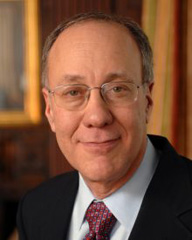Previous speakers and artists
| |
 |
|
November 13-16, 2012
Leadership, democracy and local government
Prof. Roger B. Myerson
|
|
|
Keynote Speaker
Professor Roger B. Myerson is a 2007 Nobel Laureate for Economics and the Glen A. Lloyd Distinguished Service Professor of Economics at the University of Chicago, who has made seminal contributions to the fields of economics and political science including his work on mechanism design theory.
Whether one considers auctions, elections or the taxes we pay, our lives are governed by mechanisms which make collective decisions while attempting to take account of individual preferences. Such mechanisms are designed to deliver the greatest social good despite the fact that individual participants may act for their own gain rather than for the general well-being of society. Studying such mechanisms is the goal of mechanism design theory, and mechanism design can be described as the art of producing institutions that align individual incentives with overall social goals.
Mechanism design theory is a branch of game theory (which psychologists refer to as the theory of social situations) and extends the application of game theory to ask about the consequence of applying different types of rules to a given problem. As a method of demonstrating which mechanism, out of all conceivable allocation mechanisms, gives the optimal result, mechanism design theory can be applied to problems as diverse as the auctioning of radio frequencies to mobile phone companies to the building of social welfare systems. Mechanism design theory offers insights into why many organizations and transactions are structured the way they are, whenever these structures are designed to help people to better trust each other when they have different information.
In game theory Professor Myerson introduced refinements of Nash's equilibrium concept and developed techniques to characterize the effects of communication when individuals have different information. His analysis of incentive constraints in economic communication introduced some of the fundamental ideas in mechanism design theory, including the revelation principle and the revenue-equivalence theorem in auctions and bargaining. Mechanism design theory tries to simulate market conditions in such a way as to maximize gains for all parties. As buyers and sellers within a market rarely know one another's motives or ambitions, resources may be lost or misallocated because of information asymmetry.
Professor Myerson addressed this problem by proposing the revelation principle, wherein buyers are offered an incentive for truthfully reporting what they would pay for goods or services. He discovered a fundamental connection between the allocation to be implemented and the monetary transfers needed to induce informed agents to reveal their information truthfully. Therefore mechanism design theory allows for people to distinguish situations in which markets work well from those in which they do not.
Professor Myerson's path-breaking contribution to mechanism design theory has helped economists to identify efficient trading mechanisms, regulation schemes and voting procedures. Today, the theory plays a central role in many areas of economics. Professor Myerson has also applied game-theoretic tools to political science, analyzing how political incentives can be affected by different electoral systems and constitutional structures. He has worked on the economic analysis of political institutions and contributed to the understanding of the process of democratization.
Professor Myerson is the author of Game Theory: Analysis of Conflict (1991) and Probability Models for Economic Decisions (2005). He also has published numerous articles in Econometrica, the Journal of Economic Theory, Games and Decisions, and the International Journal of Game Theory, for which he served as an editorial board member for ten years.
Professor Myerson completed his PhD in applied mathematics from Harvard University with his thesis on A Theory of Cooperative Games. He taught for 25 years in the Kellogg School of Management at Northwestern University, where he conducted most of his Nobel-winning research, before becoming Professor of Economics at the University of Chicago in 2001. He is a member of the American Academy of Arts and Sciences and of the National Academy of Sciences.
Professor Myerson's recent work on democratization has raised critical questions about American policy in occupied Iraq.
SCHEDULE
Tuesday, November 13, 2012
10:00 Dialogue with school students at the Shrewsbury International School in Bangkok (Thailand) (not a public event)
14:00 Keynote speech and dialogue at the University of the Thai Chamber of Commerce in Bangkok (Thailand)
Information and free seat reservation:
phone (02) 697-6380-2, fax (02) 692-3168, email utccresearch.sup@riped.utcc.ac.th
Thursday, November 15, 2012
14:00 Keynote speech and dialogue at Foreign Trade University (in cooperation with the National Economics University) in Hanoi (Vietnam)
Information and free seat reservation:
phone (04) 3259-5156, (016) 8647-0746, email hoangnamftu@yahoo.com
Friday, November 16, 2012
09:00 Round table discussion with policy makers at the Ho Chi Minh National Academy of Politics and Public Administration in Hanoi (Vietnam) (not a public event) |
|